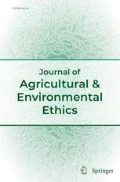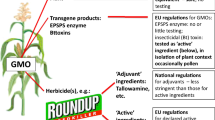Abstract
This paper examines the ethical andsocial questions that underlie the present UKdiscussion whether GM crops and organicagriculture can co-exist within a given regionor are mutually exclusive. A EuropeanCommission report predicted practicaldifficulties in achieving sufficientseparation distances to guarantee lowerthreshold levels proposed for GM material inorganic produce. Evidence of gene flow betweensome crops and their wild relatives has beena key issue in the recent Government consultation toconsult on whether or not to authorizecommercial planting of GM crops, following theresults of the current UK farm scale trials.The admixture of imported Bt transgenes intolandrace varieties of Mexican maize alsopresents difficulties. An ethical evaluationis made of the claim that organic growersshould expect protection from adventitioustraces of GM constructs in their products. Towhat extent – on either side of the debate –can any particular group in society set upagricultural standards for itself that mayeffectively restrain others from an otherwisejust business? The assumptions behind notionslike ``purity'' and ``contamination'' areexamined, together with their underlying viewsof nature and human intervention. The 2001UK Agriculture and Environmental BiotechnologyCommission report is relevant to theseissues. While the Government wishes to promotethe UK biotechnology industry and is underpressure from US claims of trade restraint, astrong organic lobby demands purity from GMcontamination. Does this adversarial framingof the issues reflect broader public opinionin the UK public consultation? Inarriving at policy decisions, the role of thevirtue of tolerance is considered inpost-modern and Christian ethical contexts.
Similar content being viewed by others
REFERENCES
Agriculture Environment Biotechnology Commission, Crops on Trial (DTI Publications, London, 2001).
BBC On-line, Sainsbury's Phase Out GM Food, 17 March (1999), http://news.bbc.co.uk/ 1/hi/uk/298229.stm.
Brock, A.-K. et al., Scenarios for Co-Existence of Genetically Modified, Conventional and Organic Crops in European Agriculture (Institute for Prospective Studies, EC Joint Research Centre, 2002).
Bruce, D. M., “Finding a Balance over Precaution,”Journal of Agricultural and Environmental Ethics 15 (2001), 7–16.
Bruce, D. and A. Bruce (eds.), Engineering Genesis (Earthscan Publications, London, 1998).
Bruce, D. M. and J. T. Eldridge, “The Role of Values in Risk Perception in theGMDebate,” in M. P. Cottam, D.W. Harvey, R. P. Pape, and J. E. Tait (eds.), Foresight and Precaution (Balkema, Rotterdam, 2000).
Charters, Y. M., A. Robertson, and G. Squire, Investigation of Feral Oil Seed Rape Population, DETR Research Report 12 (Department of Environment, Transport and the Regions, London, 1999).
Church of Scotland, Reports to the General Assembly and Deliverances of the General Assembly 1999: The Society, Religion and Technology Project Report on Genetically Modified Food, pp. 20/93–20/103 and Board of National Mission Deliverances 42-45, p. 20/4.
Five Year Freeze Campaign, You Are What You Eat, Leaflet of the Five Year Freeze Campaign (1999).
Marris, C., B. Wynne, P. Simmons, and S. Weldon, Public Perceptions of Agricultural Biotechnology in Europe (European Commission, Brussels, 2001).
Orson, J., Gene Stacking in Herbicide Tolerant Oilseed Rape: Lessons from the North American Experience, English Nature Research Report 43 (English Nature, Peterborough, 2002).
Quist, D. and I. H. Chapela, “Transgenic DNA Introgressed into Traditional Maize Landraces in Oaxaca, Mexico,” Nature 414 (2001), 541–543.
Soil Association, Contrasting the Use of Genetic Engineering in Medicine and Agriculture (Soil Association, Bristol, 1999).
Soil Association, Genetic Engineering — the Key Issues (Soil Association, Bristol, 1999).
Author information
Authors and Affiliations
Rights and permissions
About this article
Cite this article
Bruce, D. Contamination, Crop Trials, and Compatibility. Journal of Agricultural and Environmental Ethics 16, 595–604 (2003). https://doi.org/10.1023/B:JAGE.0000004961.84390.ee
Issue Date:
DOI: https://doi.org/10.1023/B:JAGE.0000004961.84390.ee



